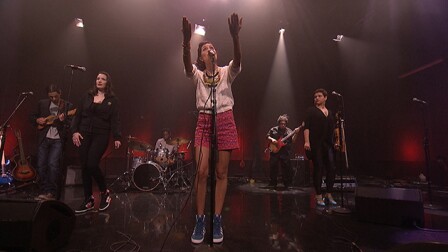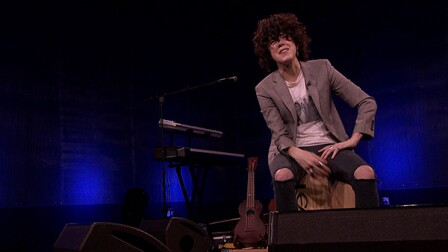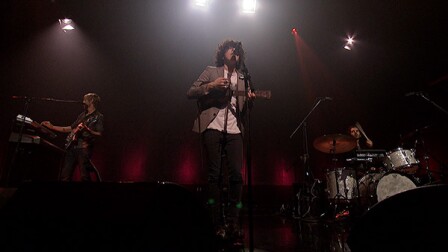
First Person: Noah and the MegaFauna
Noah and the MegaFauna bring their eclectic sound, ranging from gypsy jazz to indie rock, to KCET' s Studio A.
Discover more about Noah and the MegaFauna in their own words.
On the Band's Origins
Noah Lit: It started because I've always been a guitar player but when my kind of indie, rock and roll band broke up I really wanted to get away from playing electric guitar for a little while. I got really into the music of Django Reinhardt and gypsy jazz and so it started out just as me just learning these kind of weird [guitar techniques].You kind of have to hold the guitar different and there's different patterns and different fingerings and everything. As I was doing it I would go "you know what, if I do this two times, and this little melody over it... Oh, that's a song!" And so all of a sudden I had ten songs and I was like "oh great, now I have to start another band." So that was kind of the beginning and I roped in my brother Josh and my other brother Gabriel who lives in New York, and we kind of just made this record together that was a lot of fun.
About Django
NL: He's a roma gypsy from.He was alive in the 1930's and he basically took guitar improvisation to kind of a new level. But the interesting thing about Django was that he had burned his two fingers. There's probably Django aficionados out there watching this going "now that's not how it went down." But anyway I'm going to tell the brief version. So he burnt these two fingers so he had to hold the guitar and make the chords differently than anybody had previously done it. Just out of his handicap or whatever. I mean, it seems silly to call it a handicap considering how that guy could play. But, so he invented his own way of looking at the neck of the guitar so that rather than it being a thing that goes from top to bottom, it became a thing that goes from here to here, you know. It became lateral instead of vertical. And when you start getting into it, it changes the way that you play.
He's an interesting dude. I had always loved him as a kid. But I grew up in San Antonio, Texas and then Austin, Texas and it was, you know, old. And it was before the internet and it was like, you couldn't learn that style because nobody that I had heard of in the whole entire state of Texas knew how to play like that. So the game has changed a lot nowadays, like I can go online and just watch tutorials of people that have studied it their whole lives and just be like "Oh, that's how it," you know? So that was kind of how it all started I just started geeking out for like, a year.
On How the Sound Evolved
NL: You know so Django was kind of the start but I really wanted to fuse in some of my other people that I've always loved like Tom Waits and Charles Mingus on some of the horn arrangements and I wanted to do something kind of jazzier. For whatever that means. I think people that really play jazz like Emily and Steven probably wouldn't, and Chris wouldn't call what we are doing jazz, but to me this is as jazzy as we'll ever possibly get.
I just took all my records and threw them into a blender and was like, there's a little bit of Tom Waits, a little Django, a little Radiohead, there's just a little bit of everything in there.

On the Album, "Anthems for a Stateless Nation"
NL: The album became a bit of a concept record. If you look at the artwork you can see there's kind of this whole Noah's Ark theme because my name's Noah and I've always kind of grown up with this mythos of apocalyptic, you know, the guy that survives the apocalypse. That's the story of my name or whatever and so I was always kind of fascinated by that. The album started into this kind of concept record basically of the story, this narrative of the great panic. And then having to sail above it and in the end hopefully finding a place to start over.
On Reflecting the Economic Downturn
NL: When I started really getting into the style that would probably be around 2008 and it was kind of right when Obama was taking office and it seemed like things were going to get better and then the financial markets just dropped out. The first song on the record is called "We Knew We had it Coming," which is this kind of idea of like "there's all this terrible stuff and we're and we're trying to fight against it but we know that ultimately, we kind of deserve it" for you know, the way we live, the collective "we." It's kind of a response to just this growing darkness over the past couple of years I guess.
The last track is called "We'll Sail Above This" and I wrote it with my friend Will Chancellor who's an amazing author. The alternate title was going to be like "Screw You Goldman Sachs." You tried, you ran things into the ground and now we're going to go up and above you.
That's a little cynical. But you know, it fits within the narrative. I mean, you can imagine if you were in that situation just starting to despair after a certain amount of time like, there's no where to go, you're living just to live, and is there even a point? But I'm not that dark, it's a story.
It's a weird thing because we're partly culpable, you know? It is sort of is our fault in a way because we weren't paying attention. But then again it's totally not our fault because it was all people that kind of took over ten years before we were supposed to pay attention. And it's a pretty frustrating place to be. I guess I could not sit around and play guitar all day and maybe go do politics or something but, I don't know. As an artist I think there is some place to talk about these things. And I don't really necessarily want people to think of this as a strictly political band, but there are certainly political and if not political, allegorical themes that run through it.
On the Nomadic Experience of Los Angeles
NL: A big part of the idea is this record is this idea of travel and wandering and not really belonging anywhere. Which is obviously, it's gypsy jazz influenced so that just found its way in very obviously. And like the last song tonight is "You Can Never Go Home." And it's just this idea, and I think maybe it's me living in Southern California. Echo Park and L.A. in a lot of ways is a community of people that kind of are from all over the place and there's all these different styles and all these different influences, which is part of what I love so much about it. But it also gives you a bit of a feeling of displacement all the time.











